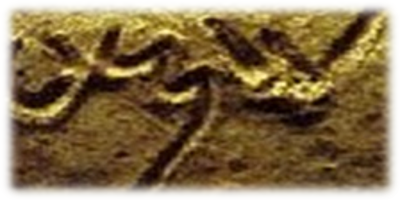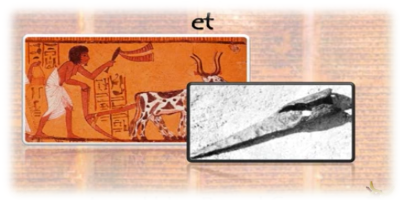You shall walk after the LORD your God and fear him, and keep his commandments and obey his voice, and you shall serve him and cleave to him. (RSV, Deuteronomy 13:4)
In this study we will be examining each of the words in this verse in order to understand it correctly from an Hebraic perspective.
Walk
The Hebrew verb הלך (H.L.K, Strong's #3212) literally means to "walk," as can be seen in the following passage.
And Abner and his men walked all that night through the plain… (KJV, 2 Samuel 2:29)
This word is also used frequently in a figurative sense as can be seen in the following passage.
And if thou wilt walk in my ways, to keep my statutes and my commandments, as thy father David did walk, then I will lengthen thy days. (KJV, 1 Kings 3:14)
In this passage, YHWH is asking Solomon to "walk" in the footsteps of his father David, who walked in the footsteps of YHWH. A son "walks" in the footsteps of his father, a student "walks" in the footsteps of his teacher and a people "walk" in the footsteps of their ancestors. In our English language, we call this "culture." Many of your thoughts and actions are a result of "walking" in the footsteps of your parents, family, neighbors and community. In the case of Israel, their culture was to patterned after YHWH's teachings, but the other nations culture was patterned after other gods.
And you shall not walk in the customs of the nation which I am casting out before you; for they did all these things, and therefore I abhorred them. (RSV, Leviticus 20:23)
The Hebrew language always uses concrete concepts to express abstract thought. While we may use an abstract word like "culture," the Hebrew language will use a much more concrete word, such as "walking," to express the same idea. Israel was commanded to walk in YHWH's footsteps (follow YHWH's customs) and not walk in the footsteps of other gods (follow the customs of other nations).
Fear
This Hebrew noun is used forty-five times and is most frequently translated as fear. In our English language fear is a state of excitedness, in a negative way, toward something terrible. Before we look at the Hebraic meaning of this word we will examine its use in the common context of "the Fear of the Lord" which appears twenty-seven times.
The fear of the LORD is instruction in wisdom, and humility goes before honor. (Proverbs 15:33, RSV)
The common understanding of this verse is that if one is afraid of the Lord he will have wisdom but, as we shall see this is not consistent with its use in the Hebrew language. The Hebrew for this phrase is יראת יהוה (yirat Yahwehv). When two nouns are placed together they are in the construct state meaning that these two words should be considered one. Another clue that these two nouns are in the construct is the change of the letter ה (h). When the first word of the construct phrase ends with the letter ה (h), it changed to the letter ת (t).
Below is a complete list of construct phrases from the book of Genesis where the second word in the construct is "the Lord" (Yahweh).
The Word of the Lord (Genesis 15:1)
The Voice of the Lord (Genesis 3:8)
The Face of the Lord (Genesis 4:16)
The Name of the Lord (Genesis 4:26)
The Eyes of the Lord (Genesis 6:8)
The Garden of the Lord (Genesis 13:10)
The Angel of the Lord (Genesis 16:7)
The Way of the Lord (Genesis 18:19)
The Mount of the Lord (Genesis 22:14)
You will notice that in every instance the first word in the construct (word, voice, etc) belongs to the second word of the construct (Yahweh). The "fear" in the phrase "the fear of the Lord" is not our fear; it is the Lord's fear. Because God cannot "fear" we must look to the Ancient Hebrew concrete meaning of this word to understand it.
The word yirah comes from the parent root yar which means "to flow" and is related to words meaning river and rain, from their flowing, and to throw in the sense of flowing. From this we can see that when one is afraid the insides begin to shake, a flowing of the insides. But as the word yirah means "to flow" it is not limited to "fear" alone.
In our introductory verse we saw that wisdom comes from this "fear of the Lord." Compare that with Exodus 31:3 - "And I have filled him with the spirit of God, in wisdom, and in understanding, and in knowledge, and in all manner of workmanship." It is "the Spirit of God (the Lord)" that gives us wisdom in the same way that "the fear of the Lord" does. The Hebrew word for "spirit" is "ruach" literally meaning the "wind," which is also a flowing. The "fear of the Lord" is his Spirit which flows out of him into us giving us wisdom, knowledge and understanding.
Keep
When most people read “keep his commandments,” they assume it means “obey his commandments.” If the Hebrew verb שמר (Sh.M.R , Strong's #8104) meant “obey,” then the Aaronic blessing would be translated as “May YHWH bless you and obey you” (Numbers 67:24). The verb שמר literally means to “guard,” to “protect”-“May YHWH bless (respect) you and guard you. ”
How does one “guard” God’s commandments (or directives)? By learning, teaching and doing them just as we read in Exodus 18:20, “And you will teach (this verb, which is the root of the word zohar, means “bring to light”) them the customs (hhuqiym, the plural form of hhoq) and teachings (torot, the plural form of torah) and you will make known to them the path they will walk in and the work which they must do. ”
For a more detailed look at this word and other words related to walking in the path of YHWH, I recommend you watch my video series “The Way of Yahweh,” available on the home page of the website. You can also search the Ancient Hebrew Research Center YouTube channel with the word “keep” for additional videos on the subject.
Commandment
This Hebrew word is usually translated as a "command" or "commandment". By definition a command is "To direct with authority; give orders to" and "To have control or authority over; rule: a general who commands an army". Is this the meaning of the Hebrew word mitsvah? When the Torah says "And it will be righteousness for us, if we are careful to do all this commandment before the LORD our God, as he has commanded us" (RSV Deuteronomy 6:25), is it telling us that God our general is giving us an order to obey or is the Ancient Hebrew understanding something different?
Remembering that the Ancient Hebrews were concrete thinkers, we need to understand the meaning of this word based on the Ancient Hebrew perspective of thought. We, as Western Greco-Roman thinkers, are very comfortable using abstract words but not the Ancient Hebrews. Each word painted a picture of action and this is also true for the word mitsvah. We are going to look at other roots and words that are closely related to this word and its roots and all of them when combined will paint a very clear picture of action which is completely lost in the English translations of the Bible.
The parent root צו (tsav) means "direction". From this parent comes the child root צוה (tsavah) meaning "to direct". From this child root comes the word מצוה (mitsvah) also meaning a "direction".
The parent root צא (tsa) means "excrement" in the sense of "going out". From this parent root comes the child root צוא (yatsa) meaning "to go out". From this child root comes the word מצוא (motsah) meaning a "going out" or to "proceed".
The parent root צי (tsiy) means a "nomad" or "ship" (as a nomad on the sea). From this parent root comes the word ציי (tsiyiy) meaning a "desert" and ציון (tsion) meaning a "sign".
At first glance these three sets of roots do not appear to have anything in common that is until we see these words through Hebrew eyes. The action painted by the parent root צי (tsiy) and its related words, is the landmarks (signs such as mountains, ranges, wadis, rock outcroppings, etc.) of the desert are used by the nomad to follow to the next encampment, pasture or water hole. The action painted by the parent root צא (tsa) and its related words, is the migrations of the nomad through the desert. The action painted by the parent root צו (tsav) and its related words including the word mitsvah, is the directions taken by the nomad by following the landmarks through the desert.
Getting back to our word מצוה (mitsvah) we need to read this word as a "direction" one is to take in their migration. Our life is a journey through the desert and in this life we are given landmarks or signs which guide us in this journey. The Torah, the Bible, the words of God is these landmarks. When God says "honor your father and mother" he is giving us a landmark which gives us a direction to go. If we follow each of these landmarks we will not become lost in our journey and will arrive at the ultimate landmark - Zion. The word Zion is ציון (tsion) in Hebrew and is the very same word we looked at previously meaning a "sign" or "landmark".
Obey
The Hebrew word behind the English word “obey” is the verb שמע (Sh.M.A, Strong's #8085). In reality, there is no Hebrew word that means “obey,” in the same sense as it does in English. While I do not believe it is necessary to learn Hebrew to be able to understand the Bible from an Hebraic perspective, it is important that we learn to read the Bible from an Hebraic perspective. In other words, our definition of Biblical words should not come from an English dictionary, but rather from a Hebrew dictionary.
When we hear the word “obey,” we assume the English definition “to comply with or follow the commands, restrictions, wishes, or instruction of another.” While this definition may very well apply in this passage, it would not in the following passage where I will translate the Hebrew verb שמע as “obey.”
And YHWH obeyed your words… (Deuteronomy 1:34)
Just as there is no Hebrew word meaning “obey,” there also is no English word for שמע. While this Hebrew verb is often translated as “hear,” it means much more than just a hearing or listening, it more means to “hear and respond appropriately.” When the Bible says that Moses “heard” YHWH, it means that he heard him and then he acted upon what he heard. When the Bible says that YHWH heard the people, it means that he heard them and then he acted upon what he heard.
Voice
The word "QoL" (Strong's #6963) can be translated as; voice, noise, sound or thunder. In the Hebrew mind each of these are its "voice".
Thunder is the voice of the sky.
"and Moses stretched out his staff toward the sky and Yahweh sent thunder [qol]..." (Exodus 9:23)
The sound of the trumpet is its voice.
"when you hear the sound [qol] of the trumpet" (Joshua 6:5)
Before looking at the original meaning of this word let's look at some other word that are related.
QahaL (Strong's #6951): This word is usually translated as assembly, congregation or community but is better understood as a flock; "and Moses spoke into the ears of the flock" (Deuteronomy 31:30).
maQ'heL (Strong's #4721): This word is the pasture; "In the pasture they will bless Yahweh God..." (Psalm 68:27) - When the "ma" is added to a word it usually means "the place of..". In this case it will be "the place of the flock".
ma'QeL (Strong's #4731): "with sandals on your feet and your staff in your hand..." (Exodus 12:11)
Can you see a common theme in these words; voice, flock, pasture and staff? They are all related to the shepherd. The voice of the shepherd calls the flock to the pasture and he uses his staff to direct and protect them.
When the original more Hebraic understanding of words is known, Biblical passages come to life as in the following.
"These are the words Yahweh spoke to all the flock on the mountain in the middle of the cloud of fire and thick darkness with a great voice..." (Deuteronomy 5:22).
In this passage the Hebraic imagery is that God is the shepherd who calls his flock to the pasture.
Serve
The word “serve,” is the Hebrew verb עבד (Ah.B.D, Strong's #5647). The participle form of this verb, meaning “serving,” is pronounced oved and may possibly be the origin of the English word “obey,” as the “servant” is one who “obeys” the master. This is more evident in the word “obedience,” which begins with “obed,” very similar to the Hebrew word oved. The noun form of this verb is עבד (eved, Strong's #5647) and is usually translated as “servant.” Derived from this noun is the name Obadiah (ovad’yah in Hebrew) meaning “servant of Yah” or, “the one who obeys Yah.”
While the verb עבד (Ah.B.D, Strong's #5647) is most frequently translated as “serve,” it more literally means to perform labor or work on behalf of another. The first use of this verb is found in the following passage.
when no plant of the field was yet in the earth and no herb of the field had yet sprung up -- for the LORD God had not caused it to rain upon the earth, and there was no man to till the ground (RSV, Genesis 2:5)
In this passage the verb עבד (Ah.B.D, Strong's #5647) is translated as “till,” but if we apply the full meaning of this word in this passage, it says, “and there was no man to work on behalf of the ground.” According to Genesis 1:28, man is to “subdue” the land, but here we see that man is to “serve” the land. Man’s relationship with the land is symbiotic. While the land serves man, man is also to serve the land.

Like what you’re discovering? Continue the journey from Bible reader to translator.
|






